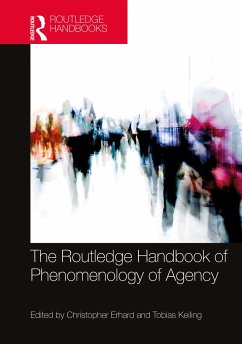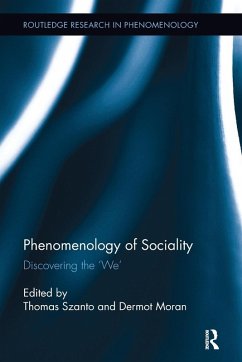
The Routledge Handbook of Phenomenology of Emotion
Versandkostenfrei!
Versandfertig in 6-10 Tagen
235,99 €
inkl. MwSt.

PAYBACK Punkte
118 °P sammeln!
The emotions occupy a fundamental place in philosophy, going back to Aristotle. However, the phenomenology of the emotions has until recently remained a relatively neglected topic. The Routledge Handbook of Phenomenology of Emotion is an outstanding guide and reference source to this important and fascinating topic. Comprising forty-nine chapters by a team of international contributors, this handbook covers the following topics:historical perspectives, including Brentano, Husserl, Sartre, Levinas and Arendt;contemporary debates, including existential feelings, situated affectivity, embodiment,...
The emotions occupy a fundamental place in philosophy, going back to Aristotle. However, the phenomenology of the emotions has until recently remained a relatively neglected topic. The Routledge Handbook of Phenomenology of Emotion is an outstanding guide and reference source to this important and fascinating topic. Comprising forty-nine chapters by a team of international contributors, this handbook covers the following topics:
historical perspectives, including Brentano, Husserl, Sartre, Levinas and Arendt;contemporary debates, including existential feelings, situated affectivity, embodiment, art, morality and feminism;self-directed and individual emotions, including happiness, grief, self-esteem and shame;social emotions, including sympathy, aggresive emotions, collective emotions and political emotions;borderline cases of emotion, including solidarity, trust, pain, forgiveness and revenge.
Essential reading for students and researchers in philosophy studying phenomenology, ethics, moral psychology and philosophy of psychology, The Routledge Handbook of Phenomenology of Emotion is also suitable for those in related disciplines such as religion, sociology and anthropology.
historical perspectives, including Brentano, Husserl, Sartre, Levinas and Arendt;contemporary debates, including existential feelings, situated affectivity, embodiment, art, morality and feminism;self-directed and individual emotions, including happiness, grief, self-esteem and shame;social emotions, including sympathy, aggresive emotions, collective emotions and political emotions;borderline cases of emotion, including solidarity, trust, pain, forgiveness and revenge.
Essential reading for students and researchers in philosophy studying phenomenology, ethics, moral psychology and philosophy of psychology, The Routledge Handbook of Phenomenology of Emotion is also suitable for those in related disciplines such as religion, sociology and anthropology.














